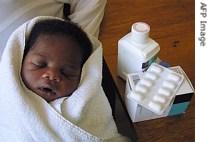-
(单词翻译:双击或拖选)
By David McAlary
Washington
10 January 2007
One of the main weapons to prevent mother-to-child transmission of the AIDS virus during birth is the drug nevirapine. But when nevirapine is used alone just once, HIV starts becoming resistant1 to it. Research in Botswana shows that the resistance is not long lasting2 and that this affordable3 drug does not have to be abandoned forever by infected mothers who have already taken it. VOA's David McAlary reports.
 |
| A baby sleeps in her mother's arms next to the anti-AIDS drug nevirapine |
The problem is that HIV resistance builds against it quickly when used alone just once because other drugs are not present to kill the virus particles that survive nevirapine. This renders the drug less effective in later combinations for treating women after their baby is born.
But the new study from Botswana shows that nevirapine can make a comeback for these women if they wait until the resistance subsides4.
"The longer out you get from that exposure to single dose nevirapine, the less detectable5 nevirapine resistance is," said Shahin Lockman of the Harvard School of Public Health in Boston.
She is lead author of the study and she notes that the waiting period for women who get the single dose of nevirapine at delivery can be as short as six months.
"If they started nevirapine-based treatment six or more months after nevirapine exposure, their treatment response was just as good, and really quite high, compared to women who did not have the single dose of nevirapine," she added. "However, the women who started nevirapine-based treatment within six months of that nevirapine exposure were much more likely to experience treatment failure."
The study published in the New England Journal of Medicine shows that waiting at least six months means that HIV-positive women are 70 percent more likely to benefit from nevirapine-based drug combinations again than women who get them sooner.
An official with the U.S. government health agency that helped fund the study calls it very important.
Lynne Mofenson is chief of research on child, adolescent, and maternal6 AIDS at the U.S. National Institute of Child Health and Human Development. She says the finding supports a World Health Organization (WHO) recommendation restricting a single dose of nevirapine only to pregnant HIV-infected women who are healthy enough to wait six months after childbirth for more nevirapine-based therapy. Otherwise, they should get other drugs during labor7.
"It shows the importance of screening women for treatment while they are pregnant and putting them on appropriate therapy while they are pregnant to avoid having to start them too soon after they received preventive therapy," she explained.
Shahin Lockman in Boston says the problem of nevirapine resistance should diminish now that more and more people are receiving combinations of AIDS drugs under expanded U.S. and international programs to deliver them to Africa and other regions hard hit by the virus.
 收听单词发音
收听单词发音
1
resistant

|
|
| adj.(to)抵抗的,有抵抗力的 | |
参考例句: |
|
|
|
2
lasting

|
|
| adj.永久的,永恒的;vbl.持续,维持 | |
参考例句: |
|
|
|
3
affordable

|
|
| adj.支付得起的,不太昂贵的 | |
参考例句: |
|
|
|
4
subsides

|
|
| v.(土地)下陷(因在地下采矿)( subside的第三人称单数 );减弱;下降至较低或正常水平;一下子坐在椅子等上 | |
参考例句: |
|
|
|
5
detectable

|
|
| adj.可发觉的;可查明的 | |
参考例句: |
|
|
|
6
maternal

|
|
| adj.母亲的,母亲般的,母系的,母方的 | |
参考例句: |
|
|
|
7
labor

|
|
| n.劳动,努力,工作,劳工;分娩;vi.劳动,努力,苦干;vt.详细分析;麻烦 | |
参考例句: |
|
|
|















